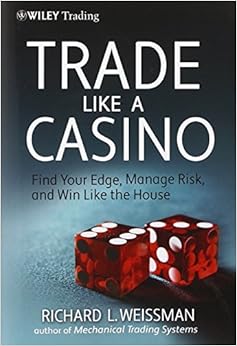



 Motivational guru Tony Robbins once observed, “People are not lazy. They simply have impotent goals – that is, goals that do not inspire them.” My experience is that this is very true of traders: many of their goals are impotent. They are written in a journal or a post-it note attached to the computer monitor, but they are not inspiring goals. They don’t bring a hunger for action.
Motivational guru Tony Robbins once observed, “People are not lazy. They simply have impotent goals – that is, goals that do not inspire them.” My experience is that this is very true of traders: many of their goals are impotent. They are written in a journal or a post-it note attached to the computer monitor, but they are not inspiring goals. They don’t bring a hunger for action.
We chastise ourselves for lack of discipline when we don’t follow through on our goals, but we never stop to think that maybe our goals sell us short.
Show me a person who has trouble getting out of bed in the morning and I’ll show you a person with impotent goals. A child has no problem leaping out of bed early Christmas morning to see what Santa has brought. That same child on a school morning? It might take a few rousings to get out of the sack.
A big part of middle age is getting so caught up in putting out fires that you forget all about setting the world ablaze. Kids have no problem dreaming about hitting that 9th inning home run for the Yankees or being a superhero. Somehow that gets lost in concerns over “practical” matters, as The Little Prince realized. But an impotent life is not a practical life at all.
Your job isn’t to find the next great market trend or setup. It’s to find the goals that inspire you, that will get you springing out of bed in the morning and excited to be tackling life through the day. As long as you have those, you’ll stay young at heart–and spirit. And you’ll persist and find those trends and setups.

 Speculating
Speculating
If somebody had told me my method would not work I nevertheless would have tried it out to make sure for myself, for when I am wrong only one thing convinces me of it, and that is, to lose money. And I am only right when I make money. That is speculating.
Risk
If all I have is ten dollars and I risk it, I am much braver than when I risk a million if I have another million salted away.
Personality
Every stock is like a human being : it has a personality – a distinctive personality – aggressive, reserved, hyper, high-strung, volatile, boring, direct, logical, predictable, unpredictable. I often studied stocks like I would study people; after a while their reactions to certain circumstances become more predictable.
Loss
A loss never bothers me after I take it. I forget it overnight. But being wrong – not taking the loss – that is what does damage to the pocketbook and to the soul.
Entry
When I’m bearish and I sell a stock, each sale must be at a lower level than the previous sale. When I am buying, the reverse is true. I must buy on a rising scale. I don’t buy long stocks on a scale down, I buy on a scale up.
General Stock Market
There is only one side to the stock market;….not the bull side or the bear side, but the right side. It took me longer to get that general principle fixed firmly in my mind than it did most of the more technical phases of the game of stock market speculation

1. Perceptions affect prices and prices affect perceptions
I believe that market prices are always wrong in the sense that they present a biased view of the future. But distortion works in both directions: not only do market participants operate with a bias, but their bias can also influence the course of events.
For instance, the stock market is generally believed to anticipate recessions, it would be more correct to say that it can help to precipitate them. Thus I replace the assertion that markets are always right with two others: I) Markets are always biased in one direction or another; II) Markets can influence the events that they anticipate.
As long as the bias is self-reinforcing, expectations rise even faster than stock prices.
Nowhere is the role of expectations more clearly visible than in financial markets. Buy and sell decisions are based on expectations about future prices, and future prices, in turn are contingent on present buy and sell decisions.
2. On Reflexivity
Fundamental analysis seeks to establish how underlying values are reflected in stock prices, whereas the theory of reflexivity shows how stock prices can influence underlying values. One provides a static picture, the other a dynamic one.
Sometimes prices change before fundamentals change. Sometimes fundamentals change before prices change. Price is what pays and until expectations change, prices don’t change. What causes expectations to change? – it could be change in fundamentals or change in prices. So what I am saying is that sometimes prices could be manipulated to change expectations, which will fuel further price momentum in a self-reinforcing way. (more…)


Risk Intelligence is a special kind of intelligence for dealing with risk and uncertainty. It doesn’t correlate with IQ, and most psychologists failed to spot it because it is found in such a disparate, rag-tag group of people – American weather-forecasters, professional gamblers, and hedge-fund managers, for example.
Dylan Evans PhD, and former senior lecturer in Behavioural Science in the School of Medicine at University of Cork, has written about his work in researching risk intelligence in ‘Risk Intelligence – How to Live with Uncertainty‘. Evans asserts that people in positions which require high risk intelligence – doctors, financial regulators and bankers, for instance – seem unable to navigate what Evans calls the “darkened room”, the domain of doubt and uncertainty.
Risk Intelligence is a traveller’s guide to the twilight zone of probabilities and speculation. Evans shows us how risk intelligence is vital to making good decisions, from dealing with climate change to combating terrorism. He argues that we can all learn a lot from expert gamblers, not just about money, but about how to make decisions in all aspects of our lives.
I read it once, and re-read it a second time. It is in my opinion, the best, yet least known book, on behavioural finance.